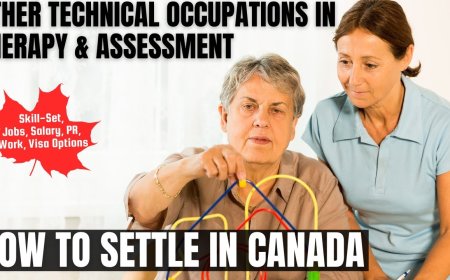Audiologists and speech-language pathologists Canada Immigration Pathways: Understanding Salaries, Work Roles, and Best Provinces
Welcome to the pathway to Canada immigration for skilled professionals and trade workers. This guide is specifically tailored for Audiologists and speech-language pathologists looking to work and settle in Canada, offering a deep dive into the essential aspects of immigration and employment in this field.
Introduction
Audiologists and speech-language pathologists play a crucial role in diagnosing and treating individuals with speech and hearing disorders. In this article, we will explore the career and immigration prospects for professionals in this field in Canada. We will delve into the profile description, main job duties, education and license requirements, necessary skills, median and retirement age, salary details, and possible visa options for Audiologists and speech-language pathologists under the NOC code 3141. Whether you are considering a career move or planning to immigrate to Canada as an Audiologist or speech-language pathologist, this article will provide you with valuable information to help you navigate the Canadian job market.
What is the Profile Description of a Audiologists and speech-language pathologists as per the Canadian National Occupation Classification (NOC) Standards?
Audiologists and speech-language pathologists are healthcare professionals who specialize in diagnosing, evaluating, and treating individuals with various communication disorders. Audiologists focus on diagnosing and treating hearing loss, tinnitus, and balance issues, while speech-language pathologists work with individuals who have difficulties with speech, language, voice, fluency, and swallowing. These professionals work in various settings such as hospitals, community health centers, rehabilitation centers, and educational institutions, as well as in private practice. Supervisory roles within this field are also common for experienced audiologists and speech-language pathologists.
What are the Main Job Duties of a Audiologists and speech-language pathologists in Canada?
- Audiologists administer audiometric tests and examinations to diagnose hearing impairment, develop habilitation/rehabilitation programs, and educate patients and families about hearing loss and treatment.
- Audiologists plan and implement personalized care plans, conduct research on hearing disorders, and may supervise audiometric technicians and health care personnel.
- Speech-language pathologists administer tests and examinations to diagnose speech, language, and swallowing disorders, develop remedial programs, and educate patients and families about communication disorders.
- Speech-language pathologists plan and implement group and personalized care plans, conduct research on communication disorders, and may supervise communicative disorders assistants and health care personnel.
What are the Education, Certifications, and Licensing Requirements to Work as Audiologists and speech-language pathologists in Canada?
To become an Audiologist, individuals must have a master's degree in audiology. For Speech-Language Pathologists, a master's degree in speech-language pathology is required. Both professions in Newfoundland and Labrador, New Brunswick, Quebec, Ontario, Manitoba, Saskatchewan, Alberta, and British Columbia must be registered with a regulatory body. Additionally, membership in the Canadian Association of Speech-Language Pathologists and Audiologists is typically necessary. In certain regions, audiologists may also need to obtain a separate license to dispense hearing aids.
What Essential Skills are Required for Audiologists and speech-language pathologists to succeed in Canada?
The profession of audiologists and speech-language pathologists requires individuals to possess a variety of essential skills in order to be successful. These professionals must have the ability to conduct research related to hearing and communication disorders, as well as develop and administer audiometric tests and examinations to diagnose hearing impairments. They must also be able to evaluate the degree and type of hearing impairment, establish personalized care plans as part of an interdisciplinary team, and plan and implement habilitation/rehabilitation programs. Additionally, audiologists and speech-language pathologists must be able to administer tests and examinations to diagnose speech, voice, language, cognitive-linguistic, and swallowing disorders, develop remedial programs to correct these disorders, and provide information and advice to patients and families. They also need to conduct research on communication disorders and be able to provide educational services to help patients and their families better understand and manage communication and swallowing disorders. Ultimately, the successful practice of audiology and speech-language pathology requires a combination of clinical expertise, research skills, teamwork, and communication abilities.
What is the Median Age and Retirement Age for Audiologists and speech-language pathologists in Canada?
On average, Audiologists and speech-language pathologists tend to retire at around 66 years old, with a median age of 40. This means that professionals in this field typically work for a significant amount of time, likely due to the specialized skills and knowledge required for their work. With the retirement age being relatively high, it is indicative of a fulfilling and rewarding career path for those who choose to pursue it. The length of time spent in the field suggests a dedication to helping others improve their communication skills and overall quality of life through their expertise.
How many job openings exist for Other Audiologists and speech-language pathologists in Canada, and what's their provincial distribution?
In Canada, there are a total of 149 job openings for Audiologists and speech-language pathologists. The province with the highest number of job openings is Québec with 109 positions available. Following Québec, Saskatchewan has 12 job openings, British Columbia has 10, Ontario has 8, Alberta has 4, Manitoba has 1, and New Brunswick also has 1 job opening. The province with the maximum job openings is Québec, while Manitoba and New Brunswick have the minimum number of job openings for Audiologists and speech-language pathologists. This shows a varying demand for professionals in this field across different provinces in Canada.
What is the hourly wage or salary of Audiologists and speech-language pathologists in different Provinces of Canada?
Audiologists and speech-language pathologists in Canada have varying wage ranges depending on the province they work in. In British Columbia, the wages for this profession range from a low of $33.00 to a high of $52.00, with a median wage of $40.38. Alberta offers slightly higher wages, with a low of $23.50, a median of $47.58, and a high of $55.00. In Saskatchewan, wages are even higher, with a low of $23.13, a median of $49.45, and a high of $60.44. Manitoba offers wages ranging from $32.00 to $54.35, with a median wage of $43.27. Ontario has slightly lower wages, with a low of $22.44, a median of $37.76, and a high of $49.10. Quebec offers wages ranging from $22.15 to $55.00, with a median wage of $33.90. In the Maritime provinces, wages for audiologists and speech-language pathologists are similar, with New Brunswick, Nova Scotia, and Newfoundland and Labrador offering median wages in the range of $42.60 to $43.00. Prince Edward Island offers slightly higher wages, with a median of $43.00 and a high of $51.50. Overall, audiologists and speech-language pathologists in Canada can expect competitive wages, with some provinces offering higher salaries than others.
What are the various visa options available for Audiologists and speech-language pathologists migrating to Canada?
Audiologists and speech-language pathologists are currently in high demand in Canada and are eligible for Category based Express Entry Invitation draws for Canadian Permanent Residency under the Healthcare Occupations Category. The Express Entry system is a streamlined process for skilled workers to immigrate to Canada based on their qualifications, work experience, and other factors. In addition to the Express Entry program, Audiologists and speech-language pathologists may also be eligible to apply for Provincial Nominee Programs or Employer Sponsored Work Visas. These programs allow candidates to apply directly for immigration based on their specific skillset and job offers from Canadian employers. There may also be other visa options available for Audiologists and speech-language pathologists, depending on individual circumstances. To learn more about the visa options and discuss your specific immigration plans, book an appointment with our professionals today.
Have Questions or Need Assistance?
If you have any queries or require assistance with your immigration plans, we're here to help. Our experienced immigration consultants are ready to provide personalized guidance tailored to your specific needs.
Don't hesitate to reach out and schedule an appointment today. Whether you're seeking clarification on immigration processes, exploring visa options, or need support with documentation, we're dedicated to assisting you every step of the way.
Book an appointment with our team to discuss your immigration goals and receive expert guidance for your journey to Canada.
What's Your Reaction?
 Like
0
Like
0
 Dislike
0
Dislike
0
 Love
0
Love
0
 Funny
0
Funny
0
 Angry
0
Angry
0
 Sad
0
Sad
0
 Wow
0
Wow
0







































































